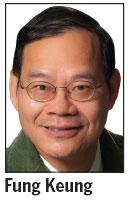Rise in the city's HIV cases unacceptable
Updated: 2013-03-19 05:30
By Fung Keung(HK Edition)
|
|||||||||

With an information explosion in an Internet era and free access to condoms, the 17 percent rise in HIV-positive cases last year in Hong Kong is unacceptable. Something needs to be done - and quickly - to arrest this disturbing trend.
HIV (human immunodeficiency virus) cases in Western countries have either fallen or stabilized in recent years. In the United States, HIV cases have remained stable at 50,000 per year over the past five years, while in the United Kingdom, the number of cases has halved from 5,000 in 2005, to 2,500 in 2012. HIV cases involving gay men in Britain peaked at 2,800 cases in 2007, and have declined since.
Yet in Hong Kong, HIV cases have more than doubled between 2003 and 2012, reaching 513 cases last year.
The Centers for Disease Control and Prevention in the United States reveals that MSM (men having sex with men) continue to be the most likely recipients of HIV infection.
The trend in HIV cases is similar in Hong Kong. In 2012, the virus was transmitted through homosexual contact between men in about half of the new cases reported, Health Department statistics show.
A Hong Kong government health consultant notes that "men who have homosexual contact have a lower awareness of using condoms, regardless of whether or not they have fixed sexual partners". It seems pertinent to have an education campaign targeted at this high-risk group. No time should be wasted.
The government's Health Department says more than 4 percent of gay men in Hong Kong are estimated to have contracted HIV, compared with less than 0.1 percent in the general population of 7 million. About one-quarter of HIV carriers in Hong Kong will develop AIDS (acquired immune deficiency syndrome), the incurable disease that often leads to death.

In South Africa, HIV prevalence is 17.8 percent among adults, and in three other southern African countries - Botswana, Lesotho and Swaziland - adult HIV prevalence rates now exceed 20 percent.
While our situation is healthier than troubling scenarios in Africa, there is no room for complacency. Hong Kong should compare its progress with advanced countries, not with poor African countries.
The city's government would be well-advised to spend more money on public education about HIV and AIDS, and to urge high-risk groups like gay men and sex workers to undergo regular HIV check-ups. The government set up an AIDS fund in 1993, but no money has been committed in the past 20 years. Financial Secretary John Tsang Chun-wah said in early March that the government would inject HK$15 billion into the Community Care Fund. Perhaps some of this money can be used to promote an awareness of safe sex and the use of condoms.
In addition to promoting more educational campaigns, additional funding should be given to the Society for AIDS Care, a non-governmental organization, and other agencies, to enable them to do more public education exercises.
Since 1984, Hong Kong has recorded almost 5,800 cases of HIV infection. Of these, more than one-quarter developed AIDS. People contracting AIDS often die a painful death. We should do something to stop the rise in HIV cases. Life is precious. The 17 percent increase in HIV cases last year cannot be tolerated. And in the information era of the 21st century, neither can ignorance.
The author is coordinator of the B.S.Sc in financial journalism program at Hong Kong Baptist University
(HK Edition 03/19/2013 page1)